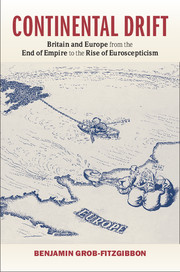Book contents
- Frontmatter
- Dedication
- Contents
- Acknowledgements
- List of abbreviations
- Introduction
- Part 1 Imperial Europeans
- 1 A world undone
- 2 Mr Churchill's Europe
- 3 Mr Bevin's response
- 4 The German problem
- 5 A disunited Europe?
- 6 The continental surprise and the fall of the Labour government
- 7 The realities of government
- 8 Perfidious Gaul
- 9 The decline and fall of the imperial Europeans
- Part 2 Post-imperial Eurosceptics
- Conclusion: Post-imperial Britain and the rise of Euroscepticism
- Notes
- Bibliography
- Index
6 - The continental surprise and the fall of the Labour government
from Part 1 - Imperial Europeans
Published online by Cambridge University Press: 05 May 2016
- Frontmatter
- Dedication
- Contents
- Acknowledgements
- List of abbreviations
- Introduction
- Part 1 Imperial Europeans
- 1 A world undone
- 2 Mr Churchill's Europe
- 3 Mr Bevin's response
- 4 The German problem
- 5 A disunited Europe?
- 6 The continental surprise and the fall of the Labour government
- 7 The realities of government
- 8 Perfidious Gaul
- 9 The decline and fall of the imperial Europeans
- Part 2 Post-imperial Eurosceptics
- Conclusion: Post-imperial Britain and the rise of Euroscepticism
- Notes
- Bibliography
- Index
Summary
Ernest Bevin was in a meeting with Dean Acheson when, on 9 May 1950, a civil servant brought him a note from the French ambassador René Massigli requesting an urgent meeting that afternoon. Bevin agreed immediately and noticed that Acheson was visibly affected by the interruption. Acheson was in London for the upcoming tripartite conference with the British and the French, and Bevin had the distinct impression that the American Secretary of State had foreknowledge of the French ambassador's request. When Bevin hosted Massigli that afternoon, the ambassador informed him that only hours before the French cabinet had voted in favour of a proposal to create a supranational authority in Western Europe that would control all steel and coal production. Although it would have no ownership rights, it would have controlling power. The French cabinet, Massigli told Bevin, believed it was ‘the first concrete proposal to bring about the unity of Western Europe’. Bevin, shocked by this unexpected news, thanked the ambassador for his time but said he could make no comment until he had seen the plan in full. He would not have to wait long, Massigli replied. The proposal would be published in the French press that evening and officially submitted to the tripartite conference for consideration later that week.
When Bevin read the newspapers – seeing the proposal for the first time, as with millions of other Frenchmen and -women, Germans, Britons and other Europeans – his alarm only grew. It claimed that ‘for more than twenty years’, France had taken ‘upon herself … the role of champion of a united Europe’. It denied economic motive, claiming that its essential aim was only ‘the service of peace’. It then stated that at the heart of a united Europe must be a strong Franco–German partnership, completely reversing the French opposition over the past four years to British plans to bring West Germany back into the mainstream of European politics. The French government proposed ‘to take action immediately on one limited but decisive point’ by placing Franco–German production of coal and steel under a common higher authority ‘within the framework of an organisation open to the participation of other countries of Europe’.
- Type
- Chapter
- Information
- Continental DriftBritain and Europe from the End of Empire to the Rise of Euroscepticism, pp. 123 - 152Publisher: Cambridge University PressPrint publication year: 2016



